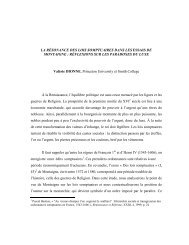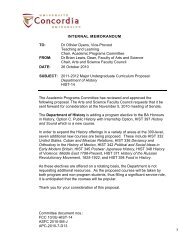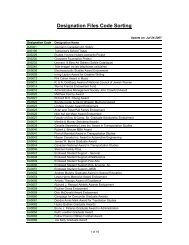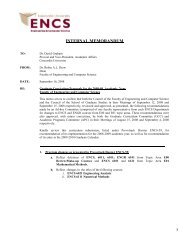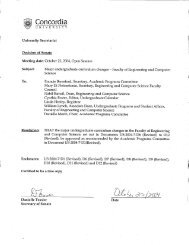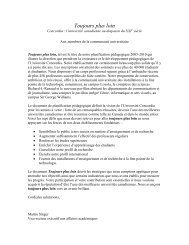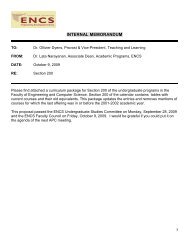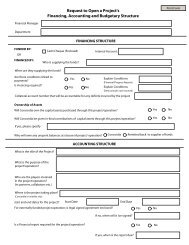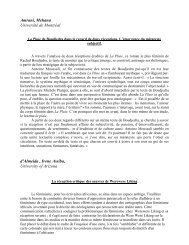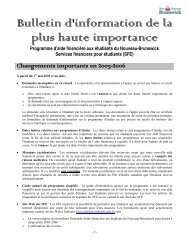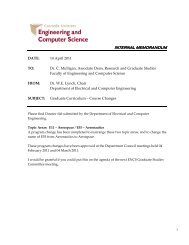Office of the Vice-President, External Relations and Secretary ...
Office of the Vice-President, External Relations and Secretary ...
Office of the Vice-President, External Relations and Secretary ...
You also want an ePaper? Increase the reach of your titles
YUMPU automatically turns print PDFs into web optimized ePapers that Google loves.
<strong>Office</strong> <strong>of</strong> <strong>the</strong> <strong>Vice</strong>-<strong>President</strong>, <strong>External</strong> <strong>Relations</strong> <strong>and</strong> <strong>Secretary</strong>-General<br />
<strong>Vice</strong>-rectorat <strong>Relations</strong> externes et Secrétariat général<br />
Decision <strong>of</strong> Senate<br />
Meeting date: October 8, 2010<br />
Subject:<br />
Major undergraduate curriculum changes – Faculty <strong>of</strong> Engineering <strong>and</strong> Computer Science<br />
Department <strong>of</strong> Electrical <strong>and</strong> Computer Engineering (Document US-2010-7-D10)<br />
Department <strong>of</strong> Mechanical <strong>and</strong> Industrial Engineering (Document US-2010-7-D11)<br />
Department <strong>of</strong> Computer Science <strong>and</strong> S<strong>of</strong>tware Engineering (Document US-2010-7-D12)<br />
To:<br />
Resolution:<br />
Enclosures:<br />
Francie Beresford, <strong>Secretary</strong>, Academic Programs Committee<br />
David Graham, Provost <strong>and</strong> <strong>Vice</strong>-<strong>President</strong>, Academic Affairs<br />
Ollivier Dyens, Chair, Academic Programs Committee<br />
Zineb Bencheikh, <strong>Secretary</strong>, Engineering <strong>and</strong> Computer Science Faculty Council<br />
Lata Narayanan, Associate Dean, Academic Programs, Faculty <strong>of</strong> Engineering <strong>and</strong><br />
Computer Science<br />
Linda Healey, Registrar<br />
Cynthia Foster, Editor, Undergraduate Calendar<br />
The major undergraduate curriculum changes in <strong>the</strong> Faculty <strong>of</strong> Engineering <strong>and</strong> Computer<br />
Science, detailed in Documents US-2010-7-D10 to D12, were approved by consent, as<br />
recommended by <strong>the</strong> Academic Programs Committee in Document US-2010-7-D5.<br />
Documents US-2010-7-D5 <strong>and</strong> D10 to D12<br />
Certified to be a true copy<br />
_____________________________________<br />
Danielle Tessier<br />
<strong>Secretary</strong> <strong>of</strong> <strong>the</strong> Board <strong>of</strong> Governors<br />
October 19, 2010<br />
1
INTERNAL MEMORANDUM<br />
TO:<br />
FROM:<br />
Dr. Ollivier Dyens, Provost & <strong>Vice</strong>-<strong>President</strong>, Teaching <strong>and</strong> Learning<br />
Dr. L. Narayanan, Associate Dean, Academic Programs, ENCS<br />
DATE: September 14, 2010<br />
RE:<br />
Curriculum Changes to programs in <strong>the</strong> ECE Department<br />
Please find attached a curriculum package for <strong>the</strong> undergraduate programs in <strong>the</strong> Department <strong>of</strong><br />
Electrical <strong>and</strong> Computer Engineering. The Department proposes changes to <strong>the</strong> options in both<br />
B. Eng in Computer Engineering <strong>and</strong> <strong>the</strong> B. Eng. in Electrical Engineering. Specifically, in <strong>the</strong> B. Eng.<br />
in Computer Engineering, <strong>the</strong> old System Hardware <strong>and</strong> System S<strong>of</strong>tware options have been deleted.<br />
Students will have <strong>the</strong> choice <strong>of</strong> enrolling in an Avionics <strong>and</strong> Embedded Systems option or not<br />
enrolling in any option. In <strong>the</strong> B. Eng. in Electrical Engineering program, <strong>the</strong> Department proposes to<br />
introduce two new options in Avionics <strong>and</strong> Control <strong>and</strong> in Power <strong>and</strong> Renewable Energy <strong>and</strong> to<br />
reorganize <strong>the</strong> old Telecommunications <strong>and</strong> Electronics/VLSI options. Students will also have <strong>the</strong><br />
choice <strong>of</strong> not enrolling in any <strong>of</strong> <strong>the</strong> options. Allowing students <strong>the</strong> choice <strong>of</strong> not enrolling in an option<br />
in both programs enables <strong>the</strong>m to tailor <strong>the</strong>ir programs according to <strong>the</strong>ir interests. The avionics<br />
options in both programs share some courses with <strong>the</strong> newly proposed Aerospace <strong>and</strong> Propulsion<br />
option in <strong>the</strong> Mechanical Engineering program.<br />
Four new courses are being proposed to support <strong>the</strong> new options: ELEC 415 (Flight Control<br />
Systems), ELEC 416 (Avionic Navigation Systems), ELEC 437 (Renewable Energy Systems), <strong>and</strong><br />
ELEC 440 (Controlled Electric Drives). Of <strong>the</strong>se ELEC 415 <strong>and</strong> ELEC 416 are cross-listed with <strong>the</strong><br />
existing MECH 480 <strong>and</strong> 482 courses respectively <strong>and</strong> ELEC 440 is to be cross-listed with <strong>the</strong><br />
graduate course ELEC 6491. In addition, two o<strong>the</strong>r new courses to be taken by students in <strong>the</strong> new<br />
options (ENGR 417 <strong>and</strong> ENGR 418) are being proposed by <strong>the</strong> MIE Department as part <strong>of</strong> <strong>the</strong>ir<br />
package <strong>and</strong> will also be taken by Mechanical Engineering students in <strong>the</strong> Aerospace <strong>and</strong> Propulsion<br />
option.<br />
Tables 1 <strong>and</strong> 2 summarize <strong>the</strong> changes in <strong>the</strong> Computer Engineering <strong>and</strong> Electrical Engineering<br />
programs respectively. Table 3 summarizes <strong>the</strong> changes to individual courses. Table 4 summarizes<br />
why we believe <strong>the</strong> changes are resource-neutral.<br />
This proposal passed <strong>the</strong> ENCS Undergraduate Studies Committee on May 3 <strong>and</strong> September 3,<br />
2010 as well as <strong>the</strong> Faculty Council on May 14 <strong>and</strong> September 10, 2010. I would be grateful if you<br />
could put it on <strong>the</strong> agenda <strong>of</strong> <strong>the</strong> next APC meeting.<br />
6<br />
1
Engineering<br />
Core<br />
Program<br />
Core:<br />
Table 1: B.Eng in Computer Engineering<br />
Present Proposed Type <strong>of</strong> Change<br />
Engineering Core consists <strong>of</strong> 30.5<br />
credits.<br />
Computer Engineering Core consists<br />
<strong>of</strong> 57.5 credits.<br />
Options: Students must choose one <strong>of</strong> two<br />
options, each consists <strong>of</strong> 32 credits:<br />
1) System Hardware Option<br />
2) System S<strong>of</strong>tware Option<br />
Electives: Each option chooses from its own list<br />
<strong>of</strong> electives:<br />
1) System Hardware Electives<br />
2) System S<strong>of</strong>tware Electives<br />
Engineering Core consists <strong>of</strong> 30.5<br />
credits.<br />
Computer Engineering Core consists <strong>of</strong><br />
63.5 credits.<br />
Students may choose <strong>the</strong> Avionics <strong>and</strong><br />
Embedded Systems Option which<br />
consists <strong>of</strong> 26 credits.<br />
OR<br />
Students may choose not to enroll in an<br />
option in which case <strong>the</strong>y must<br />
complete a minimum <strong>of</strong> 26 credits <strong>of</strong><br />
Computer Engineering Electives.<br />
Electives are organized into seven<br />
groups to facilitate course selection:<br />
1) Hardware/Electronics/VLSI<br />
2) Real-time <strong>and</strong> S<strong>of</strong>tware Systems<br />
3) Computer Science <strong>and</strong> S<strong>of</strong>tware<br />
Engineering<br />
4) Telecommunications, Networks<br />
<strong>and</strong> Signal Processing<br />
5) Control Systems<br />
6) Avionics<br />
7) O<strong>the</strong>r<br />
None<br />
Add COEN 316 <strong>and</strong> SOEN 341 into<br />
program core:<br />
COEN 316 was in <strong>the</strong> core <strong>of</strong> <strong>the</strong><br />
System Hardware Option.<br />
SOEN 341 was in <strong>the</strong> core <strong>of</strong> <strong>the</strong><br />
System S<strong>of</strong>tware Option.<br />
Delete System Hardware <strong>and</strong><br />
S<strong>of</strong>tware Options.<br />
Introduce <strong>the</strong> Avionics <strong>and</strong> Embedded<br />
Systems Option along with 3 new<br />
courses (ELEC 415, 416; ENGR 418).<br />
Allow <strong>the</strong> choice <strong>of</strong> no option.<br />
The total number <strong>of</strong> credits within an<br />
option reduces from 32 to 26.<br />
Exp<strong>and</strong> <strong>the</strong> total number <strong>of</strong> electives<br />
available.<br />
Reorganize <strong>the</strong> electives.<br />
7<br />
2
Table 2: B.Eng in Electrical Engineering<br />
Engineering<br />
Core<br />
Program<br />
Core:<br />
Present Proposed Type <strong>of</strong> Change<br />
Engineering Core consists <strong>of</strong> 30.5<br />
credits.<br />
Electrical Engineering Core consists<br />
<strong>of</strong> 59.5 credits.<br />
Options: Students must choose one <strong>of</strong> two<br />
options, each consists <strong>of</strong> 30 credits:<br />
1) Telecommunications Option<br />
2) Electronics/Systems Option<br />
Electives Each option chooses from its own list<br />
<strong>of</strong> electives:<br />
1) Telecommunications Option<br />
Electives<br />
2) Electronics/Systems Option<br />
Electives:<br />
i. Communications <strong>and</strong> Signal<br />
Processing<br />
ii. Computer Systems<br />
iii. Electronics/VLSI<br />
iv. Power <strong>and</strong> Control Systems<br />
v. Waves <strong>and</strong> Electromagnetics<br />
Engineering Core consists <strong>of</strong> 30.5<br />
credits.<br />
Electrical Engineering Core consists <strong>of</strong><br />
59.5 credits.<br />
Students may choose one <strong>of</strong> four<br />
options, each consists <strong>of</strong> 30 credits:<br />
1) Electronics/VLSI Option<br />
2) Telecommunications Option<br />
3) Power <strong>and</strong> Renewable Energy<br />
Option<br />
4) Avionics <strong>and</strong> Control Option<br />
OR<br />
Students may choose not to enroll in<br />
an option in which case <strong>the</strong>y must<br />
complete a minimum <strong>of</strong> 30 credits <strong>of</strong><br />
Electrical Engineering Electives.<br />
Each option chooses from its own list<br />
<strong>of</strong> electives as well as from <strong>the</strong><br />
Electrical Engineering Electives:<br />
1) Electronics/VLSI Option Electives<br />
2) Telecommunications Option<br />
Electives<br />
3) Power <strong>and</strong> Renewable Energy<br />
Option Electives<br />
4) Electrical Engineering Electives:<br />
i. Communications <strong>and</strong> Signal<br />
Processing<br />
ii. Computer Systems<br />
iii. Electronics/VLSI<br />
iv. Power<br />
v. Control Systems <strong>and</strong> Avionics<br />
vi. Waves <strong>and</strong> Electromagnetics<br />
vii. O<strong>the</strong>r<br />
None<br />
None<br />
Revise <strong>and</strong> rename <strong>the</strong> existing<br />
options.<br />
Introduce <strong>the</strong> Power <strong>and</strong> Renewable<br />
Energy Option along with 2 new<br />
courses (ELEC 437, 440).<br />
Introduce <strong>the</strong> Avionics <strong>and</strong> Control<br />
Option along with 4 new courses<br />
(ELEC 415, 416; ENGR 417, 418).<br />
Allow <strong>the</strong> choice <strong>of</strong> no option.<br />
Exp<strong>and</strong> <strong>the</strong> total number <strong>of</strong> electives<br />
available.<br />
Reorganize <strong>the</strong> electives.<br />
8<br />
3
Table 3: Course Changes<br />
Course Proposed Change Type <strong>of</strong> Change<br />
ELEC 415, 416, 437, 440<br />
ENGR 417, 418 (proposed by <strong>the</strong> Dept. <strong>of</strong><br />
Mechanical <strong>and</strong> Industrial Engineering)<br />
Add new courses to <strong>the</strong> program.<br />
New courses<br />
Table 4: Summary <strong>of</strong> required courses in Computer <strong>and</strong> Electrical Engineering<br />
Courses which<br />
used to be<br />
required but are<br />
no longer required<br />
COEN 313<br />
COEN 345<br />
COEN 445<br />
All <strong>the</strong> courses<br />
above were <strong>of</strong>fered<br />
1 section, once a<br />
year.<br />
Newly required courses<br />
ENGR 417 (<strong>of</strong>fered as a slot course once in 2009)<br />
ENGR 418 (new course)<br />
ELEC 415 (cross-listed with MECH 480 which is <strong>of</strong>fered once a year since 2005)<br />
ELEC 416 (cross-listed with MECH 482 which is <strong>of</strong>fered once a year since 2005)<br />
ELEC 433 (<strong>of</strong>fered twice a year since 2005 but once in 2006)<br />
ELEC 437 (<strong>of</strong>fered as a slot course twice in 2009)<br />
ELEC 440 (<strong>of</strong>fered as a slot course once a year since 2008 <strong>and</strong> to be cross-listed with ELEC 6491)<br />
ELEC 481 (<strong>of</strong>fered once a year since 2005)<br />
ELEC 483 (<strong>of</strong>fered once a year since 2005, except in 2009)<br />
9<br />
4
INTERNAL MEMORANDUM<br />
DATE: 22 March 2010<br />
TO:<br />
FROM:<br />
SUBJECT:<br />
Dr. L. Narayanan, Associate Dean, Academic Programs<br />
Faculty <strong>of</strong> Engineering <strong>and</strong> Computer Science<br />
Dr. W.E. Lynch, Chair<br />
Department <strong>of</strong> Electrical <strong>and</strong> Computer Engineering<br />
Undergraduate Curriculum<br />
Please find Dossier #34 submitted by <strong>the</strong> Department <strong>of</strong> Electrical <strong>and</strong> Computer Engineering<br />
relating to <strong>the</strong> introduction <strong>of</strong> several new courses, <strong>and</strong> major changes to <strong>the</strong> options <strong>and</strong> electives<br />
in our Electrical Engineering <strong>and</strong> Computer Engineering programs.<br />
The most important change in this dossier is <strong>the</strong> revision <strong>of</strong> <strong>the</strong> options in both Computer<br />
Engineering <strong>and</strong> Electrical Engineering.<br />
These two programs each require 120 credits. 30.5 <strong>of</strong> <strong>the</strong>se credits are taken up by <strong>the</strong> Engineering<br />
Core (courses required <strong>of</strong> all engineering students) <strong>and</strong> approximately a fur<strong>the</strong>r 60 credits are used<br />
for <strong>the</strong> program core (courses that are compulsory for all Computer Engineers or all Electrical<br />
Engineers as <strong>the</strong> case may be). This leaves 30 credits for technical electives or options for Electrical<br />
Engineering <strong>and</strong> 32 credits for Computer Engineering programs. An option is a package <strong>of</strong> courses in<br />
a particular area. It may include courses compulsory for that option (<strong>the</strong> Option Core), as well as<br />
electives particular to that option (i.e. <strong>the</strong> Option Elective List). According to accreditation<br />
regulations an option must be at least 15 credits.<br />
Options can be useful in communicating to prospective students <strong>and</strong> to employers that <strong>the</strong><br />
Department sees certain areas as being important going forward <strong>and</strong> that our programs provide<br />
specialized training in <strong>the</strong>m. Because <strong>the</strong>y should be understood by prospective students it is<br />
important that <strong>the</strong>ir titles be underst<strong>and</strong>able to those with some technical interest. They should<br />
also be in areas that <strong>the</strong> Department believes yield opportunity for young engineers.<br />
Previously each <strong>of</strong> <strong>the</strong> two programs had two options each: i) Telecommunications <strong>and</strong> ii)<br />
Electronics/Systems in Electrical Engineering; <strong>and</strong> i) System Hardware <strong>and</strong> ii) System S<strong>of</strong>tware in<br />
Computer Engineering. Students were required to choose one <strong>of</strong> <strong>the</strong> two options in <strong>the</strong>ir program.<br />
Each option required that students use all <strong>of</strong> <strong>the</strong>ir remaining credits for <strong>the</strong> option. Thus, <strong>the</strong>se<br />
options were larger than accreditation requirements <strong>and</strong> allowed for no free technical electives.<br />
These options were created in <strong>the</strong> late 1990’s. They have undergone significant updating over <strong>the</strong><br />
years but <strong>the</strong> general direction <strong>and</strong> structure <strong>of</strong> <strong>the</strong> options have not changed since <strong>the</strong>ir creation.<br />
In shaping <strong>the</strong> new options a priority was to preserve as many free technical electives as possible so<br />
that students can customize <strong>the</strong>ir degrees to <strong>the</strong>ir own interests or to respond to fast changing<br />
10
industrial needs. Free electives also supply <strong>the</strong> Department with valuable information on what<br />
areas students are most interested in, or that <strong>the</strong>y perceive as most important.<br />
It was decided that students should also be given <strong>the</strong> choice <strong>of</strong> not selecting an option <strong>and</strong> so having<br />
much more flexibility in selecting <strong>the</strong>ir technical electives.<br />
In selecting topic areas for options <strong>the</strong> Department consulted with new students, <strong>and</strong> with industry<br />
figures (including <strong>the</strong> Department’s Industrial Advisory Board).<br />
The following options were selected for Electrical Engineering:<br />
1) Telecommunications<br />
2) Electronics/VLSI<br />
3) Power <strong>and</strong> Renewable Energy<br />
4) Avionics <strong>and</strong> Control<br />
As well students may choose to not select an option.<br />
The first two options are close to <strong>the</strong> previous options although <strong>the</strong>ir size has been shrunk to 15<br />
credits. This has two benefits: a) students are given more free technical electives, <strong>and</strong> ii) it<br />
diminishes <strong>the</strong> cost <strong>of</strong> any particular option.<br />
Canada is a world leader in telecommunications <strong>and</strong> any electrical engineering program in Canada<br />
must have strength in this area. Electronics/VLSI represents a traditional area <strong>of</strong> Electrical<br />
Engineering which contributes to many application areas.<br />
The Power <strong>and</strong> Renewable Energy option is an area that <strong>the</strong> Department perceives as a growth area<br />
going forward. Many <strong>of</strong> <strong>the</strong> courses in this option have been able to attract students as free<br />
electives (representing student interest).<br />
Montreal is a global centre for <strong>the</strong> aerospace industry. Traditionally this industry hired primarily<br />
Mechanical <strong>and</strong> Industrial Engineers. However going forward industry expects to hire a much larger<br />
number <strong>of</strong> electrical <strong>and</strong> computer engineers as mechanical systems are replaced with<br />
electrical/computer systems. This option will share some courses with similar options in Computer<br />
Engineering <strong>and</strong> an expected option in Mechanical Engineering, reducing its overall cost.<br />
In Computer Engineering only one option was selected:<br />
1) Avionics <strong>and</strong> Embedded Systems<br />
As well students may choose to not select an option.<br />
Real time <strong>and</strong> embedded systems were <strong>the</strong> heart <strong>of</strong> <strong>the</strong> old system s<strong>of</strong>tware option. This has been<br />
married to <strong>the</strong> avionics courses to create a package <strong>of</strong> great interest to <strong>the</strong> local aerospace industry.<br />
The system hardware option has been eliminated.<br />
When considering <strong>the</strong>se changes <strong>the</strong> Department also decided to move two courses that had<br />
previously not been part <strong>of</strong> <strong>the</strong> Computer Engineering Core into that core, namely:<br />
11
COEN 316 Computer Architecture<br />
SOEN 341 S<strong>of</strong>tware Process<br />
It was felt that, at this point every computer engineer should have knowledge in <strong>the</strong>se two areas<br />
<strong>and</strong> so moving <strong>the</strong>m into <strong>the</strong> core was appropriate.<br />
Finally, in making <strong>the</strong>se changes four courses have been created. ELEC 415 <strong>and</strong> 416 are being<br />
created to support <strong>the</strong> new Avionics <strong>and</strong> Embedded Systems option for <strong>the</strong> Computer Engineering<br />
program <strong>and</strong> <strong>the</strong> new Avionics <strong>and</strong> Control option for <strong>the</strong> Electrical Engineering program. These two<br />
courses are similar to MECH 480 <strong>and</strong> 482 <strong>and</strong> will likely be taught in <strong>the</strong> same room as <strong>the</strong>se two<br />
courses (by a combination <strong>of</strong> instructors from both Mechanical <strong>and</strong> Industrial Engineering <strong>and</strong><br />
Electrical <strong>and</strong> Computer Engineering). ELEC 437 <strong>and</strong> ELEC 440 have previously been taught as slot<br />
courses where <strong>the</strong>y have been successful.<br />
ELEC 415 Flight Control Systems<br />
Department Curriculum Committee: Approved 12 March 2010<br />
Department Council: Approved 19 March 2010<br />
ELEC 416 Avionics Navigation Systems<br />
Department Curriculum Committee: Approved 12 March 2010<br />
Department Council: Approved 19 March 2010<br />
ELEC 437 Renewable Energy Systems [proposed by Dr. P. Pillay]<br />
Department Curriculum Committee: Approved 16 November 2009<br />
Department Council: Approved 22 January 2010<br />
ELEC 440 Controlled Electric Drives [proposed by Dr. L.A.C. Lopes]<br />
Department Curriculum Committee: Approved 10 February 2010<br />
Department Council: Approved 19 February 2010<br />
Because some care has been taken to ensure that <strong>the</strong> new options were already able to attract<br />
students to <strong>the</strong>se courses (Power <strong>and</strong> Renewable Energy) or because <strong>the</strong> main courses in an option<br />
are shared between several programs (Avionics), coupled with <strong>the</strong> reduction in size <strong>of</strong> <strong>the</strong> all <strong>of</strong> <strong>the</strong><br />
options, <strong>the</strong> Department believes this change is cost neutral, while making both <strong>of</strong> <strong>the</strong>se programs<br />
more attractive to prospective students <strong>and</strong> to employers.<br />
Aside from <strong>the</strong> dates for <strong>the</strong> course creation noted above, <strong>the</strong> options <strong>and</strong> <strong>the</strong>ir structure have been<br />
discussed a great deal over <strong>the</strong> last nine months, <strong>and</strong> very intensively since January. They were<br />
approved for <strong>the</strong> final time by <strong>the</strong> Departmental Curriculum Committee on 12 March 2010 <strong>and</strong> by<br />
Department Council on 19 March 2010.<br />
I would be grateful if you could put this dossier on <strong>the</strong> agenda <strong>of</strong> <strong>the</strong> next Undergraduate Studies<br />
meeting.<br />
12
PROGRAM AND COURSES CHANGE FORMS FOR DOCUMENT: ELEC-34 VERSION: 9<br />
PROGRAM CHANGE: Department Objectives<br />
Proposed [X] Undergraduate or [ ] Graduate Curriculum changes<br />
Calendar for academic year: 2011/2012<br />
Implementation Month/year: September 2011<br />
Faculty/School:<br />
Engineering <strong>and</strong> Computer Science<br />
Department:<br />
Department <strong>of</strong> Electrical <strong>and</strong> Computer Engineering<br />
Program:<br />
Electrical <strong>and</strong> Computer Engineering<br />
Degree:<br />
B.Eng.<br />
Calendar Section/Graduate Page Number:71.30<br />
Type <strong>of</strong> Change:<br />
[X] Editorial<br />
[ ] New Program<br />
[ ] Requirements [ ] Regulations [ ] Program Deletion<br />
Present Text (from 2010/2011) calendar<br />
Department Objectives<br />
Electrical Engineering is concerned primarily with energy <strong>and</strong><br />
information, <strong>the</strong>ir conversion <strong>and</strong> transmission in <strong>the</strong> most<br />
efficient <strong>and</strong> reliable manner. This vast field <strong>of</strong> endeavour<br />
includes many specialties <strong>and</strong> Electrical Engineers may be involved<br />
in one or more <strong>of</strong> <strong>the</strong>se throughout <strong>the</strong>ir careers. A partial list<br />
includes: electronics, integrated circuit design, very large scale<br />
integrated (VLSI) circuit design, layout <strong>and</strong> testing, controls,<br />
robotics, system simulation, telecommunications, signal processing,<br />
computer hardware design, s<strong>of</strong>tware design, power devices, power <strong>and</strong><br />
control systems, electromechanical systems, microelectromechanical<br />
devices, electromagnetics, antennas, wave guides, lasers, <strong>and</strong><br />
optoelectronics.<br />
Computer Engineering is <strong>the</strong> driving force <strong>of</strong> <strong>the</strong> information<br />
revolution <strong>and</strong> its transformation <strong>of</strong> society. Over <strong>the</strong> course <strong>of</strong><br />
<strong>the</strong>ir careers, computer engineers will be called upon to meet a<br />
number <strong>of</strong> challenges, most <strong>of</strong> which cannot be imagined today. A<br />
partial list <strong>of</strong> current specialties includes: computer<br />
architecture, digital electronics, digital circuits, very large<br />
scale integrated (VLSI) circuit design, layout <strong>and</strong> testing, digital<br />
circuit testing <strong>and</strong> reliability, s<strong>of</strong>tware design, s<strong>of</strong>tware<br />
engineering, digital communication <strong>and</strong> computer networks.<br />
The four-year programs consist <strong>of</strong> <strong>the</strong> Engineering Core, taken by<br />
all engineering students, program cores <strong>and</strong> electives. The<br />
Electrical Engineering Core provides a solid introduction to all<br />
Proposed Text<br />
Department Objectives<br />
Electrical Engineering is concerned primarily with energy <strong>and</strong><br />
information, <strong>the</strong>ir conversion <strong>and</strong> transmission in <strong>the</strong> most<br />
efficient <strong>and</strong> reliable manner. This vast field <strong>of</strong> endeavour<br />
includes many specialties <strong>and</strong> Electrical Engineers may be involved<br />
in one or more <strong>of</strong> <strong>the</strong>se throughout <strong>the</strong>ir careers. A partial list<br />
includes: electronics, integrated circuit design, very large scale<br />
integrated (VLSI) circuit design, layout <strong>and</strong> testing, controls,<br />
robotics, system simulation, telecommunications, signal processing,<br />
computer hardware design, s<strong>of</strong>tware design, power devices, power <strong>and</strong><br />
control systems, electromechanical systems, microelectromechanical<br />
devices, electromagnetics, antennas, wave guides, lasers, <strong>and</strong><br />
optoelectronics.<br />
Computer Engineering is <strong>the</strong> driving force <strong>of</strong> <strong>the</strong> information<br />
revolution <strong>and</strong> its transformation <strong>of</strong> society. Over <strong>the</strong> course <strong>of</strong><br />
<strong>the</strong>ir careers, computer engineers will be called upon to meet a<br />
number <strong>of</strong> challenges, most <strong>of</strong> which cannot be imagined today. A<br />
partial list <strong>of</strong> current specialties includes: computer<br />
architecture, digital electronics, digital circuits, very large<br />
scale integrated (VLSI) circuit design, layout <strong>and</strong> testing, digital<br />
circuit testing <strong>and</strong> reliability, s<strong>of</strong>tware design, s<strong>of</strong>tware<br />
engineering, digital communication <strong>and</strong> computer networks.<br />
The four-year programs consist <strong>of</strong> <strong>the</strong> Engineering Core, taken by<br />
all engineering students, program cores <strong>and</strong> electives. The 13<br />
Electrical Engineering Core provides a solid introduction to all<br />
D1
aspects <strong>of</strong> <strong>the</strong> discipline, to programming methodology <strong>and</strong> to <strong>the</strong><br />
design <strong>of</strong> large s<strong>of</strong>tware systems. Technical electives are scheduled<br />
to enable students to register for sets <strong>of</strong> related technical<br />
courses. Current sets <strong>of</strong> electives include: Communications <strong>and</strong><br />
Signal Processing, Computer Systems, Electronics <strong>and</strong> VLSI, Power<br />
<strong>and</strong> Control Systems, <strong>and</strong> Waves <strong>and</strong> Electromagnetics. The Computer<br />
Engineering Core provides a thorough grounding in all aspects <strong>of</strong><br />
computer hardware <strong>and</strong> s<strong>of</strong>tware. Technical electives allow students<br />
to acquire fur<strong>the</strong>r knowledge in various aspects <strong>of</strong> hardware or<br />
s<strong>of</strong>tware. A m<strong>and</strong>atory final-year design project gives students in<br />
both programs <strong>the</strong> opportunity to apply <strong>the</strong> knowledge <strong>the</strong>y have<br />
acquired to <strong>the</strong> design <strong>and</strong> testing <strong>of</strong> a working prototype.<br />
Six Quebec universities have joined toge<strong>the</strong>r with Hydro-Québec to<br />
create <strong>the</strong> Institute for Electrical Power Engineering whose primary<br />
mission is to meet <strong>the</strong> anticipated shortfall in this area. Students<br />
accepted by <strong>the</strong> Institute are expected to complete six courses<br />
<strong>of</strong>fered by participating universities. Some <strong>of</strong> <strong>the</strong>se courses are<br />
<strong>of</strong>fered in English <strong>and</strong> o<strong>the</strong>rs in French. Students register for<br />
courses at <strong>the</strong>ir home universities.<br />
aspects <strong>of</strong> <strong>the</strong> discipline, to programming methodology <strong>and</strong> to <strong>the</strong><br />
design <strong>of</strong> large s<strong>of</strong>tware systems. Technical electives are scheduled<br />
to enable students to register for sets <strong>of</strong> related technical<br />
courses. Current sets <strong>of</strong> electives include: Communications <strong>and</strong><br />
Signal Processing, Computer Systems, Electronics <strong>and</strong> VLSI, Power,<br />
Control Systems <strong>and</strong> Avionics, <strong>and</strong> Waves <strong>and</strong> Electromagnetics. The<br />
Computer Engineering Core provides a thorough grounding in all<br />
aspects <strong>of</strong> computer hardware <strong>and</strong> s<strong>of</strong>tware. Technical electives<br />
allow students to acquire fur<strong>the</strong>r knowledge in various aspects <strong>of</strong><br />
hardware or s<strong>of</strong>tware. A m<strong>and</strong>atory final-year design project gives<br />
students in both programs <strong>the</strong> opportunity to apply <strong>the</strong> knowledge<br />
<strong>the</strong>y have acquired to <strong>the</strong> design <strong>and</strong> testing <strong>of</strong> a working<br />
prototype.<br />
Six Quebec universities have joined toge<strong>the</strong>r with Hydro-Québec to<br />
create <strong>the</strong> Institute for Electrical Power Engineering whose primary<br />
mission is to meet <strong>the</strong> anticipated shortfall in this area. Students<br />
accepted by <strong>the</strong> Institute are expected to complete six courses<br />
<strong>of</strong>fered by participating universities. Some <strong>of</strong> <strong>the</strong>se courses are<br />
<strong>of</strong>fered in English <strong>and</strong> o<strong>the</strong>rs in French. Students register for<br />
courses at <strong>the</strong>ir home universities.<br />
Rationale: To reflect program modifications made within this dossier.<br />
Resource Implications: none<br />
14<br />
D2
PROGRAM AND COURSES CHANGE FORMS FOR DOCUMENT: ELEC-34 VERSION: 9<br />
PROGRAM CHANGE: Computer Engineering Core & Options<br />
Proposed [X] Undergraduate or [ ] Graduate Curriculum changes<br />
Calendar for academic year: 2011/2012<br />
Implementation Month/year: September 2011<br />
Faculty/School:<br />
Engineering <strong>and</strong> Computer Science<br />
Department:<br />
Department <strong>of</strong> Electrical <strong>and</strong> Computer Engineering<br />
Program:<br />
Computer Engineering<br />
Degree:<br />
B.Eng.<br />
Calendar Section/Graduate Page Number:71.30<br />
Type <strong>of</strong> Change:<br />
[ ] Editorial<br />
[ ] New Program<br />
[X] Requirements [ ] Regulations [ ] Program Deletion<br />
Present Text (from 2010/2011) calendar<br />
71.30.2 Course Requirements (BEng in Computer Engineering)<br />
The program in Computer Engineering consists <strong>of</strong> <strong>the</strong> Engineering<br />
Core, <strong>the</strong> Computer Engineering Core, <strong>and</strong> one <strong>of</strong> <strong>the</strong> two options as<br />
set out below. The normal length <strong>of</strong> <strong>the</strong> program is 120 credits.<br />
Engineering Core: (30.5 credits)<br />
See §71.20.5.<br />
Proposed Text<br />
71.30.2 Course Requirements (BEng in Computer Engineering)<br />
The program in Computer Engineering consists <strong>of</strong> <strong>the</strong> Engineering<br />
Core, <strong>the</strong> Computer Engineering Core, <strong>and</strong> one <strong>of</strong> <strong>the</strong> two choices as<br />
set out below. The normal length <strong>of</strong> <strong>the</strong> program is 120 credits.<br />
Engineering Core: (30.5 credits)<br />
See §71.20.5.<br />
Computer Engineering Core<br />
Credits<br />
Computer Engineering Core<br />
Credits<br />
COEN 231 Introduction to Discrete Ma<strong>the</strong>matics 3.00<br />
COEN 243 Programming Methodology I 3.00<br />
COEN 244 Programming Methodology II 3.00<br />
COEN 311 Computer Organization <strong>and</strong> S<strong>of</strong>tware 3.50<br />
COEN 312 Digital Systems Design I 3.50<br />
COEN 317 Microprocessor Systems 4.00<br />
COEN 346 Operating Systems 4.00<br />
COEN 352 Data Structures <strong>and</strong> Algorithms 3.00<br />
COEN 390 Computer Engineering Team Design 3.00<br />
Project<br />
COEN 490 Capstone Computer Engineering Design 4.00<br />
Project<br />
ELEC 264 Signals <strong>and</strong> Systems I 3.00<br />
ELEC 311 Electronics I 4.00<br />
ELEC 321 Introduction to Semiconductor<br />
Materials <strong>and</strong> Devices<br />
3.50<br />
COEN 231 Introduction to Discrete Ma<strong>the</strong>matics 3.00<br />
COEN 243 Programming Methodology I 3.00<br />
COEN 244 Programming Methodology II 3.00<br />
COEN 311 Computer Organization <strong>and</strong> S<strong>of</strong>tware 3.50<br />
COEN 312 Digital Systems Design I 3.50<br />
COEN 316 Computer Architecture <strong>and</strong> Design 3.00<br />
COEN 317 Microprocessor Systems 4.00<br />
COEN 346 Operating Systems 4.00<br />
COEN 352 Data Structures <strong>and</strong> Algorithms 3.00<br />
COEN 390 Computer Engineering Team Design 3.00<br />
Project<br />
COEN 490 Capstone Computer Engineering Design 4.00<br />
Project<br />
ELEC 264 Signals <strong>and</strong> Systems I 3.00<br />
ELEC 311 Electronics I 4.00<br />
ELEC 321 Introduction to Semiconductor<br />
Materials <strong>and</strong> Devices<br />
3.50<br />
15<br />
D3
ELEC 353 Transmission Line Circuits <strong>and</strong><br />
3.00<br />
Electromagnetic Waves<br />
ELEC 364 Signals <strong>and</strong> Systems II 3.00<br />
ELEC 370 Modelling <strong>and</strong> Analysis <strong>of</strong> Physical 3.50<br />
Systems<br />
ELEC 372 Fundamentals <strong>of</strong> Control Systems 3.50<br />
_____<br />
57.50<br />
ELEC 353 Transmission Line Circuits <strong>and</strong> 3.00<br />
Electromagnetic Waves<br />
ELEC 364 Signals <strong>and</strong> Systems II 3.00<br />
ELEC 370 Modelling <strong>and</strong> Analysis <strong>of</strong> Physical 3.50<br />
Systems<br />
ELEC 372 Fundamentals <strong>of</strong> Control Systems 3.50<br />
SOEN 341 S<strong>of</strong>tware Process 3.00<br />
_____<br />
63.50<br />
System Hardware Option<br />
Credits<br />
COEN 313 Digital Systems Design II 3.50<br />
COEN 315 Digital Electronics 3.50<br />
COEN 316 Computer Architecture <strong>and</strong> Design 3.00<br />
COEN 451 VLSI Circuit Design 4.00<br />
Electives chosen from <strong>the</strong> list below 18.00<br />
_____<br />
32.00<br />
System Hardware Electives<br />
Credits<br />
COEN 320 Introduction to Real-Time Systems 3.00<br />
COEN 345 S<strong>of</strong>tware Testing <strong>and</strong> Validation 4.00<br />
COEN 421 Embedded Systems <strong>and</strong> S<strong>of</strong>tware Design 4.00<br />
COEN 432 Applied Genetic <strong>and</strong> Evolutionary 3.00<br />
Systems<br />
COEN 445 Communication Networks <strong>and</strong> Protocols 4.00<br />
COEN 498 Topics in Computer Engineering 3.00<br />
COMP 371 Computer Graphics 4.00<br />
COMP 426 Multicore Programming 4.00<br />
ELEC 312 Electronics II 4.00<br />
ELEC 363 Fundamentals <strong>of</strong> Telecommunication 3.50<br />
Systems<br />
ELEC 423 Introduction to Analog VLSI 4.00<br />
ELEC 442 Digital Signal Processing 3.50<br />
ELEC 451 Computer-Aided Modelling <strong>and</strong> Design <strong>of</strong> 4.00<br />
Circuits<br />
ELEC 462 Digital Communications 3.50<br />
ELEC 465 Networks Security <strong>and</strong> Management 3.50<br />
ELEC 472 Advanced Telecommunication Networks 3.50<br />
ELEC 481 Linear Systems 3.50<br />
ENGR 245 Mechanical Analysis 3.00<br />
ENGR 411 Special Technical Report 1.00<br />
ENGR 472 Robot Manipulators 3.50<br />
SOEN 341 S<strong>of</strong>tware Process 3.00<br />
SOEN 342 S<strong>of</strong>tware Requirements <strong>and</strong><br />
Specifications<br />
3.00<br />
Students may choose <strong>the</strong> Avionics <strong>and</strong> Embedded Systems option;<br />
o<strong>the</strong>rwise, students must follow II.<br />
I.Avionics <strong>and</strong> Embedded Systems Option Core<br />
Credits<br />
COEN 320 Introduction to Real-time Systems 3.00<br />
COEN 421 Embedded Systems <strong>and</strong> S<strong>of</strong>tware Design 4.00<br />
ELEC 415 Flight Control Systems 3.50<br />
ELEC 416 Avionic Navigation Systems 3.00<br />
ENGR 418 Integration <strong>of</strong> Avionics Systems 3.00<br />
Minimum number <strong>of</strong> Elective credits<br />
must be chosen from <strong>the</strong><br />
Computer Engineering Electives list<br />
9.5<br />
_____<br />
26.00<br />
II. For Students NOT Selecting an Option:<br />
Choose a minimum <strong>of</strong> 26 credits from <strong>the</strong> Computer Engineering<br />
Electives list. No more than 16 <strong>of</strong> <strong>the</strong>se credits may be chosen<br />
from topic area C - Computer Science <strong>and</strong> S<strong>of</strong>tware Engineering.<br />
Computer Engineering Electives<br />
Courses are listed in groups to facilitate course<br />
selection.<br />
A. Hardware/Electronics/VLSI Credits<br />
COEN 313 Digital Systems Design II 3.50<br />
COEN 315 Digital Electronics 3.50<br />
COEN 451 VLSI Circuit Design 4.00<br />
ELEC 312 Electronics II 4.00<br />
ELEC 423 Introduction to Analog VLSI 4.00<br />
ELEC 451 Computer-Aided Modeling <strong>and</strong> Design <strong>of</strong><br />
Circuits<br />
4.00<br />
16<br />
D4
SOEN 343 S<strong>of</strong>tware Architecture <strong>and</strong> Design I 3.00<br />
SOEN 344 S<strong>of</strong>tware Architecture <strong>and</strong> Design II 3.00<br />
ELEC 458<br />
Techniques in Electromagnetic<br />
Compatibility<br />
3.00<br />
System S<strong>of</strong>tware Option<br />
Credits<br />
B. Real-time <strong>and</strong> S<strong>of</strong>tware Systems Credits<br />
COEN 320 Introduction to Real-Time Systems 3.00<br />
COEN 345 S<strong>of</strong>tware Testing <strong>and</strong> Validation 4.00<br />
COEN 421 Embedded Systems <strong>and</strong> S<strong>of</strong>tware Design 4.00<br />
COEN 445 Communication Networks <strong>and</strong> Protocols 4.00<br />
SOEN 341 S<strong>of</strong>tware Process 3.00<br />
Electives chosen from <strong>the</strong> list below 14.00<br />
_____<br />
32.00<br />
System S<strong>of</strong>tware Electives<br />
Credits<br />
COEN 313 Digital Systems Design II 3.50<br />
COEN 315 Digital Electronics 3.50<br />
COEN 316 Computer Architecture <strong>and</strong> Design 3.00<br />
COEN 432 Applied Genetic <strong>and</strong> Evolutionary 3.00<br />
Systems<br />
COEN 498 Topics in Computer Engineering 3.00<br />
COMP 335 Introduction to Theoretical Computer 3.00<br />
Science<br />
COMP 353 Databases 4.00<br />
COMP 371 Computer Graphics 4.00<br />
COMP 426 Multicore Programming 4.00<br />
COMP 442 Compiler Design 4.00<br />
COMP 451 Database Design 4.00<br />
COMP 465 Design <strong>and</strong> Analysis <strong>of</strong> Algorithms 3.00<br />
COMP 472 Artificial Intelligence 4.00<br />
COMP 474 Intelligent Systems 4.00<br />
ELEC 363 Fundamentals <strong>of</strong> Telecommunication 3.50<br />
Systems<br />
ELEC 442 Digital Signal Processing 3.50<br />
ELEC 465 Networks Security <strong>and</strong> Management 3.50<br />
ELEC 472 Advanced Telecommunication Networks 3.50<br />
ELEC 481 Linear Systems 3.50<br />
ENGR 245 Mechanical Analysis 3.00<br />
ENGR 411 Special Technical Report 1.00<br />
ENGR 472 Robot Manipulators 3.50<br />
SOEN 342 S<strong>of</strong>tware Requirements <strong>and</strong><br />
3.00<br />
Specifications<br />
SOEN 343 S<strong>of</strong>tware Architecture <strong>and</strong> Design I 3.00<br />
SOEN 344 S<strong>of</strong>tware Architecture <strong>and</strong> Design II 3.00<br />
SOEN 357 User Interface Design 3.00<br />
SOEN 431 Formal Methods 3.00<br />
COEN 320 Introduction to Real-time Systems 3.00<br />
COEN 345 S<strong>of</strong>tware Testing <strong>and</strong> Validation 4.00<br />
COEN 421 Embedded Systems <strong>and</strong> S<strong>of</strong>tware Design 4.00<br />
COEN 432 Applied Genetic <strong>and</strong> Evolutionary Systems3.00<br />
C. Computer Science <strong>and</strong> S<strong>of</strong>tware Engineering Credits<br />
COMP 335 Introduction to Theoretical Computer 3.00<br />
Science<br />
COMP 353 Databases 4.00<br />
COMP 371 Computer Graphics 4.00<br />
COMP 426 Multicore Programming 4.00<br />
COMP 428 Parallel Programming 4.00<br />
COMP 442 Compiler Design 4.00<br />
COMP 451 Database Design 4.00<br />
COMP 465 Design <strong>and</strong> Analysis <strong>of</strong> Algorithms 3.00<br />
COMP 472 Artificial Intelligence 4.00<br />
COMP 474 Intelligent Systems 4.00<br />
SOEN 342 S<strong>of</strong>tware Requirements <strong>and</strong><br />
3.00<br />
Specifications<br />
SOEN 343 S<strong>of</strong>tware Architecture <strong>and</strong> Design I 3.00<br />
SOEN 344 S<strong>of</strong>tware Architecture <strong>and</strong> Design II 3.00<br />
SOEN 357 User Interface Design 3.00<br />
SOEN 431 Formal Methods 3.00<br />
SOEN 448 Management <strong>of</strong> Evolving Systems 3.00<br />
D. Telecommunications, Networks <strong>and</strong> Signal Credits<br />
Processing<br />
COEN 445 Communication Networks <strong>and</strong> Protocols 4.00<br />
ELEC 363 Fundamentals <strong>of</strong> Telecommunication 3.50<br />
Systems<br />
ELEC 442 Digital Signal Processing 3.50<br />
ELEC 462 Digital Communications 3.50<br />
ELEC 465 Networks Security <strong>and</strong> Management 3.50<br />
ELEC 472 Advanced Telecommunication Networks 3.50<br />
E. Control Systems Credits<br />
17<br />
D5
SOEN 448 Management <strong>of</strong> Evolving Systems 3.00<br />
SOEN 449 Component Engineering 3.00<br />
ELEC 481 Linear Systems 3.50<br />
ELEC 482 System Optimization 3.50<br />
ELEC 483 Real-time Computer Control Systems 3.50<br />
ENGR 245 Mechanical Analysis 3.00<br />
ENGR 472 Robot Manipulators 3.50<br />
F. Avionics Credits<br />
ELEC 415 Flight Control Systems 3.50<br />
ELEC 416 Avionic Navigation Systems 3.00<br />
ENGR 417 St<strong>and</strong>ards, Regulations <strong>and</strong><br />
3.00<br />
Certification<br />
ENGR 418 Integration <strong>of</strong> Avionics Systems 3.00<br />
G. O<strong>the</strong>r Credits<br />
COEN 498 Topics in Computer Engineering 3.00<br />
ENGR 411 Special Technical Report 1.00<br />
Rationale: The changes made herein reflect <strong>the</strong> addition <strong>of</strong> "No Option".<br />
Resource Implications: None.<br />
18<br />
D6
PROGRAM AND COURSES CHANGE FORMS FOR DOCUMENT: ELEC-34 VERSION: 9<br />
PROGRAM CHANGE: Electrical Engineering Core & Options<br />
Proposed [X] Undergraduate or [ ] Graduate Curriculum changes<br />
Calendar for academic year: 2011/2012<br />
Implementation Month/year: September 2011<br />
Faculty/School:<br />
Engineering <strong>and</strong> Computer Science<br />
Department:<br />
Department <strong>of</strong> Electrical <strong>and</strong> Computer Engineering<br />
Program:<br />
Electrical Engineering<br />
Degree:<br />
B.Eng.<br />
Calendar Section/Graduate Page Number:71.30<br />
Type <strong>of</strong> Change:<br />
[ ] Editorial<br />
[ ] New Program<br />
[X] Requirements [ ] Regulations [ ] Program Deletion<br />
Present Text (from 2010/2011) calendar<br />
71.30.1 Course Requirements (BEng in Electrical Engineering)<br />
The program in Electrical Engineering consists <strong>of</strong> <strong>the</strong> Engineering<br />
Core, <strong>the</strong> Electrical Engineering Core, <strong>and</strong> one <strong>of</strong> two options as<br />
set out below. The normal length <strong>of</strong> <strong>the</strong> program is 120 credits.<br />
Engineering Core (30.5 credits)<br />
See §71.20.5.<br />
Proposed Text<br />
71.30.1 Course Requirements (BEng in Electrical Engineering)<br />
The program in Electrical Engineering consists <strong>of</strong> <strong>the</strong> Engineering<br />
Core, <strong>the</strong> Electrical Engineering Core, <strong>and</strong> one <strong>of</strong> five choices as<br />
set out below. The normal length <strong>of</strong> <strong>the</strong> program is 120 credits.<br />
Engineering Core (30.5 credits)<br />
See §71.20.5.<br />
Electrical Engineering Core<br />
Credits<br />
Electrical Engineering Core<br />
Credits<br />
COEN 231 Introduction to Discrete Ma<strong>the</strong>matics 3.00<br />
COEN 243 Programming Methodology I 3.00<br />
COEN 244 Programming Methodology II 3.00<br />
COEN 311 Computer Organization <strong>and</strong> S<strong>of</strong>tware 3.50<br />
COEN 312 Digital Systems Design I 3.50<br />
ELEC 251 Fundamentals <strong>of</strong> Applied Electromagnetics 3.00<br />
ELEC 264 Signals <strong>and</strong> Systems I 3.00<br />
ELEC 311 Electronics I 4.00<br />
ELEC 321 Introduction to Semiconductor Materials <strong>and</strong> 3.50<br />
Devices<br />
ELEC 331 Fundamentals <strong>of</strong> Electrical Power Engineering 3.50<br />
ELEC 351 Electromagnetic Waves <strong>and</strong> Guiding Structures 3.00<br />
ELEC 363 Fundamentals <strong>of</strong> Telecommunications Systems 3.50<br />
ELEC 364 Signals <strong>and</strong> Systems II 3.00<br />
COEN 231 Introduction to Discrete Ma<strong>the</strong>matics 3.00<br />
COEN 243 Programming Methodology I 3.00<br />
COEN 244 Programming Methodology II 3.00<br />
COEN 311 Computer Organization <strong>and</strong> S<strong>of</strong>tware 3.50<br />
COEN 312 Digital Systems Design I 3.50<br />
ELEC 251 Fundamentals <strong>of</strong> Applied Electromagnetics 3.00<br />
ELEC 264 Signals <strong>and</strong> Systems I 3.00<br />
ELEC 311 Electronics I 4.00<br />
ELEC 321 Introduction to Semiconductor Materials <strong>and</strong> 3.50<br />
Devices<br />
ELEC 331 Fundamentals <strong>of</strong> Electrical Power Engineering 3.50<br />
ELEC 351 Electromagnetic Waves <strong>and</strong> Guiding Structures 3.00<br />
ELEC 363 Fundamentals <strong>of</strong> Telecommunications Systems<br />
19<br />
3.50<br />
D7
ELEC 365 Complex Variables <strong>and</strong> Partial Differential 3.00<br />
Equations<br />
ELEC 370 Modelling <strong>and</strong> Analysis <strong>of</strong> Physical Systems 3.50<br />
ELEC 372 Fundamentals <strong>of</strong> Control Systems 3.50<br />
ELEC 390 Electrical Engineering Team Design Project 3.00<br />
ELEC 490 Capstone Electrical Engineering Design Project 4.00<br />
Telecommunications Option<br />
_____<br />
59.50<br />
Credits<br />
ELEC 462 Digital Communications 3.50<br />
ELEC 463 Telecommunication Networks 3.00<br />
Minimum number <strong>of</strong> elective credits chosen from<br />
list below<br />
23.50<br />
_____<br />
30.00<br />
COEN 320 Introduction to Real-Time Systems 3.00<br />
COEN 346 Operating Systems 4.00<br />
COEN 352 Data Structures <strong>and</strong> Algorithms 3.00<br />
ELEC 425 Optical Devices for High-Speed Communications 3.50<br />
ELEC 442 Digital Signal Processing 3.50<br />
ELEC 453 Microwave Engineering 3.50<br />
ELEC 456 Antennas 3.50<br />
ELEC 457 Design <strong>of</strong> Wireless RF Systems 3.00<br />
ELEC 464 Wireless Communications 3.00<br />
ELEC 465 Networks Security <strong>and</strong> Management 3.50<br />
ELEC 466 Introduction to Optical Communication Systems 3.50<br />
ELEC 472 Advanced Telecommunication Networks 3.50<br />
ELEC 498 Topics in Electrical Engineering 3.00<br />
ENGR 411 Special Technical Report 1.00<br />
Electronics/Systems Option*<br />
Credits<br />
COEN 315 Digital Electronics 3.50<br />
ELEC 312 Electronics II 4.00<br />
ELEC 442 Digital Signal Processing 3.50<br />
Minimum number <strong>of</strong> elective credits chosen from<br />
lists below<br />
19.00<br />
_____<br />
30.00<br />
ELEC 364 Signals <strong>and</strong> Systems II 3.00<br />
ELEC 365 Complex Variables <strong>and</strong> Partial Differential 3.00<br />
Equations<br />
ELEC 370 Modelling <strong>and</strong> Analysis <strong>of</strong> Physical Systems 3.50<br />
ELEC 372 Fundamentals <strong>of</strong> Control Systems 3.50<br />
ELEC 390 Electrical Engineering Team Design Project 3.00<br />
ELEC 490 Capstone Electrical Engineering Design Project 4.00<br />
Students may choose one <strong>of</strong> <strong>the</strong> following options:<br />
I. Electronics/VLSI Option<br />
II. Telecommunications Option<br />
III. Power <strong>and</strong> Renewable Energy Option<br />
IV. Avionics <strong>and</strong> Control Option<br />
O<strong>the</strong>rwise, students must follow V.<br />
_____<br />
59.50<br />
I. Electronics/VLSI Option Credits<br />
COEN 315 Digital Electronics 3.50<br />
COEN 451 VLSI Design I 4.00<br />
ELEC 312 Electronics II 4.00<br />
Minimum number <strong>of</strong> Elective credits:<br />
at least 3.5 <strong>of</strong> <strong>the</strong>se 18.5 credits must be taken<br />
from <strong>the</strong> Electronics/VLSI Option Electives list.<br />
The rest may be chosen from <strong>the</strong> Electrical<br />
Engineering Electives list.<br />
18.50<br />
_____<br />
30.00<br />
Electronics/VLSI Option Electives<br />
Credits<br />
COEN 313 Digital Systems Design II 3.50<br />
ELEC 421 Solid State Devices 3.50<br />
ELEC 422 Design <strong>of</strong> Integrated Circuit Components 3.50<br />
ELEC 423 Introduction to Analog VLSI 4.00<br />
ELEC 424 VLSI Process Technology 3.50<br />
ELEC 425 Optical Devices for High-Speed Communications 3.50<br />
ELEC 433 Power Electronics 3.50<br />
20<br />
ELEC 441 Modern Analog Filter Design 3.50<br />
D8
Note: Students accepted by <strong>the</strong> Institute for Electrical Power<br />
Engineering are expected to complete five courses as required by<br />
<strong>the</strong> Institute, <strong>and</strong> <strong>of</strong>fered by participating universities, from<br />
among: ELEC 430, 431, 432, 433, 434, 435, 436, 438.<br />
Some <strong>of</strong> <strong>the</strong>se courses are <strong>of</strong>fered in French. Students register for<br />
courses at <strong>the</strong>ir home universities. Students accepted by <strong>the</strong><br />
Institute must complete a minimum <strong>of</strong> 120 credits in total.<br />
Electronics/Systems Electives<br />
Courses are listed in groups to facilitate course<br />
Credits<br />
selection.<br />
ELEC 498 Topics in Electrical Engineering 3.00<br />
ELEC 411 Special Technical Report 1.00<br />
A. Communications <strong>and</strong> Signal Processing Credits<br />
ELEC 441 Modern Analog Filter Design 3.50<br />
ELEC 462 Digital Communications 3.50<br />
ELEC 463 Telecommunication Networks 3.00<br />
ELEC 464 Wireless Communications 3.00<br />
ELEC 465 Networks Security <strong>and</strong> Management 3.50<br />
ELEC 472 Advanced Telecommunication Networks 3.50<br />
B. Computer Systems Credits<br />
COEN 313 Digital Systems Design II 3.50<br />
COEN 316 Computer Architecture <strong>and</strong> Design 3.00<br />
COEN 317 Microprocessor Systems 4.00<br />
COEN 320 Introduction to Real-Time Systems 3.00<br />
COEN 345 S<strong>of</strong>tware Testing <strong>and</strong> Validation 4.00<br />
COEN 346 Operating Systems 4.00<br />
COEN 352 Data Structures <strong>and</strong> Algorithms 3.00<br />
COEN 421 Embedded Systems <strong>and</strong> S<strong>of</strong>tware Design 4.00<br />
COEN 432 Applied Genetic <strong>and</strong> Evolutionary Systems 3.00<br />
SOEN 341 S<strong>of</strong>tware Process 3.00<br />
SOEN 342 S<strong>of</strong>tware Requirements <strong>and</strong> Specifications 3.00<br />
SOEN 343 S<strong>of</strong>tware Architecture <strong>and</strong> Design I 3.00<br />
C. Electronics/VLSI Credits<br />
COEN 451 VLSI Circuit Design 4.00<br />
ELEC 421 Solid State Devices 3.50<br />
ELEC 422 Design <strong>of</strong> Integrated Circuit Components 3.50<br />
ELEC 423 Introduction to Analog VLSI 4.00<br />
ELEC 442 Digital Signal Processing 3.50<br />
II. Telecommunications Option<br />
Credits<br />
ELEC 442 Digital Signal Processing 3.50<br />
ELEC 462 Digital Communications 3.50<br />
ELEC 463 Telecommunication Networks 3.00<br />
Minimum number <strong>of</strong> Elective credits:<br />
20.00<br />
at least 6 <strong>of</strong> <strong>the</strong>se 20 credits must be taken from<br />
<strong>the</strong> Telecommunications Option Electives list.<br />
The rest may be chosen from <strong>the</strong> Electrical<br />
Engineering Electives list.<br />
_____<br />
30.00<br />
Telecommunications Option Electives<br />
Credits<br />
ELEC 425 Optical Devices for High-Speed Communications 3.50<br />
ELEC 453 Microwave Engineering 3.50<br />
ELEC 456 Antennas 3.50<br />
ELEC 457 Design <strong>of</strong> Wireless RF Systems 3.00<br />
ELEC 464 Wireless Communications 3.00<br />
ELEC 465 Networks Security <strong>and</strong> Management 3.50<br />
ELEC 466 Introduction to Optical Communication Systems 3.50<br />
ELEC 472 Advanced Telecommunication Networks 3.50<br />
III. Power <strong>and</strong> Renewable Energy Option<br />
Credits<br />
ELEC 433 Power Electronics 3.50<br />
ELEC 437 Renewable Energy Systems 3.00<br />
ELEC 440 Controlled Electric Drives 3.50<br />
ELEC 481 Linear Systems 3.50<br />
Minimum number <strong>of</strong> Elective credits:<br />
at least 3 <strong>of</strong> <strong>the</strong>se 16.5 credits must be taken<br />
from <strong>the</strong> Power <strong>and</strong> Renewable Energy Option<br />
Electives list. The rest may be chosen from <strong>the</strong><br />
Electrical Engineering Electives list.<br />
16.50<br />
_____<br />
30.00<br />
21<br />
D9
ELEC 424 VLSI Process Technology 3.50<br />
ELEC 425 Optical Devices for High-Speed Communications 3.50<br />
D. Power <strong>and</strong> Control Systems Credits<br />
ELEC 430 Electrical Power Equipment* 3.50<br />
ELEC 431 Electrical Power Systems 3.50<br />
ELEC 432 Control <strong>of</strong> Electrical Power Conversion Systems* 3.50<br />
ELEC 433 Power Electronics 3.50<br />
ELEC 434 Behaviour <strong>of</strong> Power Systems* 3.50<br />
ELEC 435 Electromechanical Energy Conversion Systems 3.50<br />
ELEC 436 Protection <strong>of</strong> Power Systems* 3.50<br />
ELEC 438 Industrial Electrical Systems* 3.50<br />
ELEC 439 Hybrid Electric Vehicle Power System Design <strong>and</strong> 3.00<br />
Control<br />
ELEC 481 Linear Systems 3.50<br />
ELEC 482 System Optimization 3.50<br />
ELEC 483 Real-Time Computer Control Systems 3.50<br />
ENGR 245 Mechanical Analysis 3.00<br />
ENGR 472 Robot Manipulators 3.50<br />
*Note: ELEC 430, 432, 434, 436, <strong>and</strong> 438 are usually <strong>of</strong>fered in <strong>the</strong><br />
French language.<br />
E. Waves <strong>and</strong> Electromagnetics Credits<br />
ELEC 451 Computer-Aided Modelling <strong>and</strong> Design <strong>of</strong> Circuits 4.00<br />
ELEC 453 Microwave Engineering 3.50<br />
ELEC 455 Acoustics 3.00<br />
ELEC 456 Antennas 3.50<br />
ELEC 457 Design <strong>of</strong> Wireless RF Systems 3.00<br />
ELEC 458 Techniques in Electromagnetic Compatibility 3.00<br />
Power <strong>and</strong> Renewable Energy Option Electives<br />
Credits<br />
ELEC 430 Electrical Power Equipment* 3.50<br />
ELEC 431 Electrical Power Systems 3.50<br />
ELEC 432 Control <strong>of</strong> Electrical Power Conversion Systems* 3.50<br />
ELEC 434 Behaviour <strong>of</strong> Power Systems* 3.50<br />
ELEC 435 Electromechanical Energy Conversion Systems 3.50<br />
ELEC 436 Protection <strong>of</strong> Power Systems* 3.50<br />
ELEC 438 Industrial Electrical Systems* 3.50<br />
ELEC 439 Electric <strong>and</strong> Hybrid Vehicles 3.00<br />
ELEC 442 Digital Signal Processing 3.50<br />
ELEC 482 System Optimization 3.50<br />
ELEC 483 Real-time Computer Control Systems 3.50<br />
*Note: ELEC 430, 432, 434, 436, <strong>and</strong> 438 are usually <strong>of</strong>fered in <strong>the</strong><br />
French language.<br />
IV. Avionics <strong>and</strong> Control Option<br />
Credits<br />
ELEC 415 Flight Control Systems 3.50<br />
ELEC 416 Avionic Navigation Systems 3.00<br />
ELEC 483 Real-time Computer Control Systems 3.50<br />
ENGR 417 St<strong>and</strong>ards, Regulations <strong>and</strong> Certification 3.00<br />
ENGR 418 Integration <strong>of</strong> Avionics Systems 3.00<br />
Electives must be chosen from <strong>the</strong> Electrical<br />
Engineering Electives list.<br />
V. For students NOT selecting an option<br />
Choose a minimum <strong>of</strong> 30 credits from <strong>the</strong> Electrical Engineering<br />
Electives list.<br />
Electrical Engineering Electives<br />
Courses are listed in groups to facilitate course selection.<br />
14.00<br />
_____<br />
30.00<br />
A. Communications <strong>and</strong> Signal Processing Credits<br />
ELEC 441 Modern Analog Filter Design 3.50<br />
ELEC 442 Digital Signal Processing 3.50<br />
ELEC 462 Digital Communications 3.50<br />
ELEC 463 Telecommunication Networks 3.00<br />
ELEC 464 Wireless Communications 3.00<br />
ELEC 465 Networks Security <strong>and</strong> Management 3.50<br />
ELEC 466 Introduction to Optical Communication Systems 3.50<br />
ELEC 472 Advanced Telecommunication Networks 3.50<br />
B. Computer Systems Credits<br />
22<br />
COEN 313 Digital Systems Design II 3.50<br />
D10
COEN 316 Computer Architecture <strong>and</strong> Design 3.00<br />
COEN 317 Microprocessor Systems 4.00<br />
COEN 320 Introduction to Real-Time Systems 3.00<br />
COEN 345 S<strong>of</strong>tware Testing <strong>and</strong> Validation 4.00<br />
COEN 346 Operating Systems 4.00<br />
COEN 352 Data Structures <strong>and</strong> Algorithms 3.00<br />
COEN 421 Embedded Systems <strong>and</strong> S<strong>of</strong>tware Design 4.00<br />
COEN 432 Applied Genetic <strong>and</strong> Evolutionary Systems 3.00<br />
SOEN 341 S<strong>of</strong>tware Process 3.00<br />
SOEN 342 S<strong>of</strong>tware Requirements <strong>and</strong> Specifications 3.00<br />
SOEN 343 S<strong>of</strong>tware Architecture <strong>and</strong> Design I 3.00<br />
C. Electronics/VLSI Credits<br />
COEN 315 Digital Electronics 3.50<br />
COEN 451 VLSI Circuit Design 4.00<br />
ELEC 312 Electronics II 4.00<br />
ELEC 421 Solid State Devices 3.50<br />
ELEC 422 Design <strong>of</strong> Integrated Circuit Components 3.50<br />
ELEC 423 Introduction to Analog VLSI 4.00<br />
ELEC 424 VLSI Process Technology 3.50<br />
ELEC 425 Optical Devices for High-Speed Communications 3.50<br />
D. Power Credits<br />
ELEC 430 Electrical Power Equipment* 3.50<br />
ELEC 431 Electrical Power Systems 3.50<br />
ELEC 432 Control <strong>of</strong> Electrical Power Conversion Systems* 3.50<br />
ELEC 433 Power Electronics 3.50<br />
ELEC 434 Behaviour <strong>of</strong> Power Systems* 3.50<br />
ELEC 435 Electromechanical Energy Conversion Systems 3.50<br />
ELEC 436 Protection <strong>of</strong> Power Systems* 3.50<br />
ELEC 437 Renewable Energy Systems 3.00<br />
ELEC 438 Industrial Electrical Systems* 3.50<br />
ELEC 439 Hybrid Electric Vehicle Power System Design <strong>and</strong> 3.00<br />
Control<br />
ELEC 440 Controlled Electric Drives 3.50<br />
*Note: ELEC 430, 432, 434, 436, <strong>and</strong> 438 are usually <strong>of</strong>fered in <strong>the</strong><br />
French language.<br />
23<br />
D11
E. Control Systems <strong>and</strong> Avionics Credits<br />
ELEC 415 Flight Control Systems 3.50<br />
ELEC 416 Avionic Navigation Systems 3.00<br />
ELEC 481 Linear Systems 3.50<br />
ELEC 482 System Optimization 3.50<br />
ELEC 483 Real-Time Computer Control Systems 3.50<br />
ENGR 245 Mechanical Analysis 3.00<br />
ENGR 417 St<strong>and</strong>ards, Regulations, <strong>and</strong> Certification 3.00<br />
ENGR 418 Integration <strong>of</strong> Avionics Systems 3.00<br />
ENGR 472 Robot Manipulators 3.50<br />
F. Waves <strong>and</strong> Electromagnetics Credits<br />
ELEC 451 Computer-Aided Modelling <strong>and</strong> Design <strong>of</strong> Circuits 4.00<br />
ELEC 453 Microwave Engineering 3.50<br />
ELEC 455 Acoustics 3.00<br />
ELEC 456 Antennas 3.50<br />
ELEC 457 Design <strong>of</strong> Wireless RF Systems 3.00<br />
ELEC 458 Techniques in Electromagnetic Compatibility 3.00<br />
G. O<strong>the</strong>r Credits<br />
ELEC 498 Topics in Electrical Engineering 3.00<br />
ENGR 411 Special Technical Report 1.00<br />
Rationale:<br />
These changes reflect <strong>the</strong> new options <strong>and</strong> electives.<br />
Resource Implications: None.<br />
24<br />
D12
PROGRAM AND COURSES CHANGE FORMS FOR DOCUMENT: ELEC-34 VERSION: 9<br />
COURSE CHANGE: ELEC 415<br />
New Course Number:<br />
Proposed [X] Undergraduate or [ ] Graduate Curriculum changes<br />
Calendar for academic year: 2011/2012<br />
Implementation Month/year: September 2011<br />
Faculty/School:<br />
Engineering <strong>and</strong> Computer Science<br />
Department:<br />
Department <strong>of</strong> Electrical <strong>and</strong> Computer Engineering<br />
Program:<br />
Electrical Engineering, Computer Engineering<br />
Degree:<br />
B.Eng.<br />
Calendar Section/Graduate Page Number:71.60<br />
Type <strong>of</strong> Change:<br />
[ ] Course Number<br />
[ ] Course Description<br />
[ ] Course Deletion<br />
[ ] Course Title<br />
[ ] Editorial<br />
[ ] O<strong>the</strong>r - Specify:<br />
[ ] Credit Value<br />
[X] New Course<br />
[ ] Prerequisite<br />
Present Text (from<br />
20xx/20xx) calendar<br />
Proposed Text<br />
ELEC 415 (also listed as MECH 480) Flight Control Systems (3.50 credits)<br />
Prerequisite: ELEC 372. Basic flight control <strong>and</strong> flight dynamics principles. Aircraft dynamic equations <strong>and</strong><br />
performance data. Implementation <strong>of</strong> aircraft control: control surfaces <strong>and</strong> <strong>the</strong>ir operations, development <strong>of</strong> thrust<br />
<strong>and</strong> its control; autopilot systems, <strong>the</strong>ir algorithms, dynamics <strong>and</strong> interaction problems. Flight instruments,<br />
principles <strong>of</strong> operation <strong>and</strong> dynamics. Cockpit layouts - basic configuration, ergonomic design, control field<br />
forces; advanced concepts in instruments, avionics <strong>and</strong> displays; HUD; flight management systems, <strong>and</strong> communication<br />
equipment. Introduction to flight simulation: overview <strong>of</strong> visual, audio <strong>and</strong> motion simulator systems; advanced<br />
concepts in flight simulators. Lectures: three hours per week. Laboratory: two hours per week, alternate weeks.<br />
NOTE: Students who have received credit for MECH 480 may not take this course for credit.<br />
Rationale: This is a new course created for our Avionics option. It is cross-listed with MECH 480.<br />
Resource Implications: None.<br />
O<strong>the</strong>r Programs within which course is listed:<br />
None.<br />
25<br />
D13
PROGRAM AND COURSES CHANGE FORMS FOR DOCUMENT: ELEC-34 VERSION: 9<br />
COURSE CHANGE: ELEC 416<br />
New Course Number:<br />
Proposed [X] Undergraduate or [ ] Graduate Curriculum changes<br />
Calendar for academic year: 2011/2012<br />
Implementation Month/year: September 2011<br />
Faculty/School:<br />
Engineering <strong>and</strong> Computer Science<br />
Department:<br />
Department <strong>of</strong> Electrical <strong>and</strong> Computer Engineering<br />
Program:<br />
Electrical Engineering, Computer Engineering<br />
Degree:<br />
B.Eng.<br />
Calendar Section/Graduate Page Number:71.60<br />
Type <strong>of</strong> Change:<br />
[ ] Course Number<br />
[ ] Course Description<br />
[ ] Course Deletion<br />
[ ] Course Title<br />
[ ] Editorial<br />
[ ] O<strong>the</strong>r - Specify:<br />
[ ] Credit Value<br />
[X] New Course<br />
[ ] Prerequisite<br />
Present Text (from 20xx/<br />
20xx) calendar<br />
Proposed Text<br />
ELEC 416 (also listed as MECH 482) Avionic Navigation Systems (3 credits)<br />
Prerequisite: ELEC 370. Basics <strong>of</strong> modern electronic navigation systems, history <strong>of</strong> air navigation, earth<br />
coordinate <strong>and</strong> mapping systems; basic <strong>the</strong>ory <strong>and</strong> analysis <strong>of</strong> modern electronic navigation instrumentation,<br />
communication <strong>and</strong> radar systems, approach aids, airborne systems, transmitters <strong>and</strong> antenna coverage; noise <strong>and</strong><br />
losses, target detection, digital processing, display systems <strong>and</strong> technology; demonstration <strong>of</strong> avionic systems<br />
using flight simulator. Lectures: three hours per week.<br />
NOTE: Students who have received credit for MECH 482 may not take this course for credit.<br />
Rationale: This is a new course created for our Avionics option. It is cross-listed with MECH 482.<br />
Resource Implications: None.<br />
O<strong>the</strong>r Programs within which course is listed:<br />
None.<br />
26<br />
D14
PROGRAM AND COURSES CHANGE FORMS FOR DOCUMENT: ELEC-34 VERSION: 9<br />
COURSE CHANGE: ELEC 437<br />
New Course Number:<br />
Proposed [X] Undergraduate or [ ] Graduate Curriculum changes<br />
Calendar for academic year: 2011/2012<br />
Implementation Month/year: January 2011<br />
Faculty/School:<br />
Engineering <strong>and</strong> Computer Science<br />
Department:<br />
Department <strong>of</strong> Electrical <strong>and</strong> Computer Engineering<br />
Program:<br />
Electrical Engineering, Computer Engineering<br />
Degree:<br />
B.Eng.<br />
Calendar Section/Graduate Page Number:71.60<br />
Type <strong>of</strong> Change:<br />
[ ] Course Number<br />
[ ] Course Description<br />
[ ] Course Deletion<br />
[ ] Course Title<br />
[ ] Editorial<br />
[ ] O<strong>the</strong>r - Specify:<br />
[ ] Credit Value<br />
[X] New Course<br />
[ ] Prerequisite<br />
Present Text (from 20xx/20xx)<br />
calendar<br />
Proposed Text<br />
ELEC 437 Renewable Energy Systems (3 credits)<br />
Prerequisite: COEN or ELEC 390 or equivalent. Electrical basics <strong>and</strong> models <strong>of</strong> solar energy (photo-voltaics),<br />
electrical power from wind energy, electrical power from water, including wave energy, tidal energy,<br />
micro-hydro. Case studies, for example <strong>the</strong> application <strong>of</strong> solar PV to street lighting. Electrical engineering<br />
design implications. Design assignments.<br />
NOTE: Students who have received credit for this topic under an ELEC 498 number may not take this course for<br />
credit.<br />
Rationale:<br />
This course was taught for <strong>the</strong> first time in Summer 2009 as a slot course <strong>and</strong> will continue to <strong>of</strong>fer in Fall 2010. It was cross-listed<br />
with 20 undergraduates <strong>and</strong> 60 graduates. The total number <strong>of</strong> enrollment in Summer 2009 was 61, 62 in Winter 2009, <strong>and</strong> 54 in Fall 2010.<br />
Thus, it was well received, both in <strong>the</strong> numbers <strong>of</strong> students <strong>and</strong> in <strong>the</strong> overall evaluation.<br />
There is tremendous interest in this course which is expected to be maintained given <strong>the</strong> overall interest in energy in general, <strong>and</strong><br />
renewable energy in particular, world-wide <strong>and</strong> in Canada. It also supports <strong>the</strong> research we are doing with industry.<br />
Resource Implications: None.<br />
O<strong>the</strong>r Programs within which course is listed:<br />
None.<br />
27<br />
D15
PROGRAM AND COURSES CHANGE FORMS FOR DOCUMENT: ELEC-34 VERSION: 9<br />
COURSE CHANGE: ELEC 440<br />
New Course Number:<br />
Proposed [X] Undergraduate or [ ] Graduate Curriculum changes<br />
Calendar for academic year: 2011/2012<br />
Implementation Month/year: January 2011<br />
Faculty/School:<br />
Engineering <strong>and</strong> Computer Science<br />
Department:<br />
Department <strong>of</strong> Electrical <strong>and</strong> Computer Engineering<br />
Program:<br />
Electrical Engineering<br />
Degree:<br />
B.Eng.<br />
Calendar Section/Graduate Page Number:71.60<br />
Type <strong>of</strong> Change:<br />
[ ] Course Number<br />
[ ] Course Description<br />
[ ] Course Deletion<br />
[ ] Course Title<br />
[ ] Editorial<br />
[ ] O<strong>the</strong>r - Specify:<br />
[ ] Credit Value<br />
[X] New Course<br />
[ ] Prerequisite<br />
Present Text (from<br />
20xx/20xx) calendar<br />
Proposed Text<br />
ELEC 440 Controlled Electric Drives (3.5 credits)<br />
Prerequisite: ELEC 331. Elements <strong>of</strong> a drive system, characteristics <strong>of</strong> common mechanical systems, drive<br />
characteristics, operation in one, two, or four quadrants. Fully controlled rectifier drives, braking <strong>of</strong> DC<br />
motors, control <strong>of</strong> DC motors using DC/DC converters. Control <strong>of</strong> polyphase induction motors, voltage-source <strong>and</strong><br />
current-source inverter drives, frequency-controlled induction motor drives, introduction to vector control <strong>of</strong><br />
induction motor drives, field oriented control, sensor-less operation. Control <strong>of</strong> synchronous motors, permanent<br />
magnet motors. Switched reluctance motor drives, stepper motors. Brush-less DC motor drives, low-power electronic<br />
motor drives. Lectures: 3 hours per week. Laboratory: 15 hours total.<br />
NOTE: Students who have received credit for this topic under an ELEC 498 number may not take this course for<br />
credit.<br />
Rationale: This is a new course created for our Power <strong>and</strong> Renewable Energy Option. It was <strong>of</strong>fered as a slot course in Fall 2008, Winter 2009 <strong>and</strong> will continue to <strong>of</strong>fer in Winter<br />
2010.<br />
Resource Implications: None.<br />
O<strong>the</strong>r Programs within which course is listed:<br />
To be cross-listed with ELEC 6491<br />
28<br />
D16



